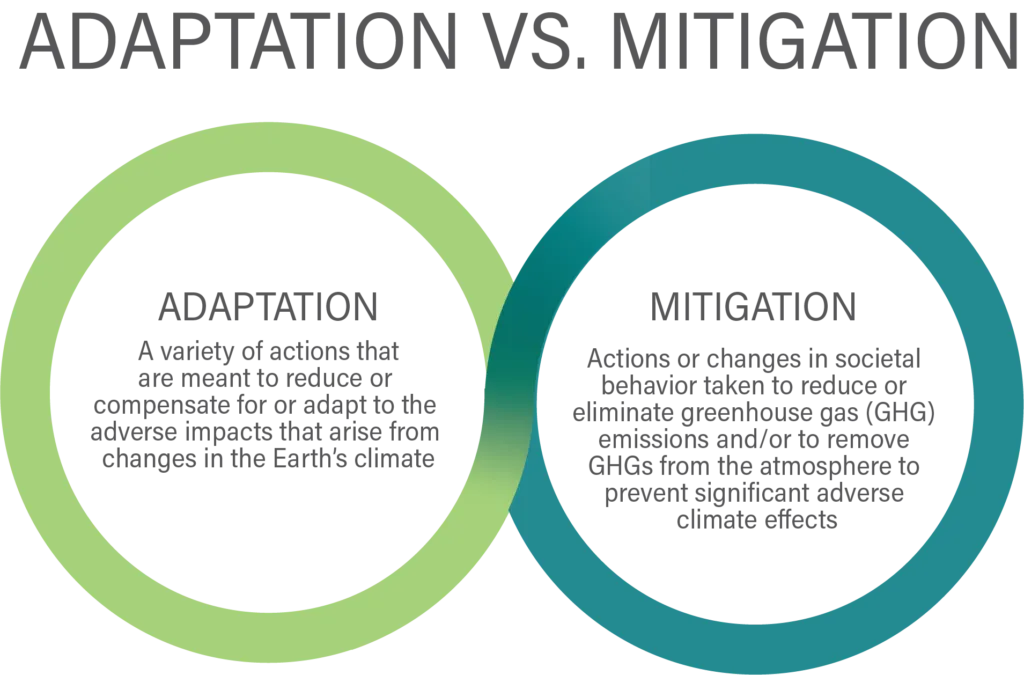Will the coming focus on climate adaptation affect our mitigation ambition?
There’s a subtle creep. It’s observable in the words of politicians, in the nuance of recent policy and in the reporting of net zero ambition. The narrative that was once designed to get everyone behind the shared ambition and action needed to keep global warming below the scientifically-agreed target of 1.5 degrees is slowly changing. Not only is the voice of the anti-net zero lobby growing louder but it has been joined by a growing acceptance that our planet is on a warming trajectory that will see these targets exceeded. This summer, France signalled that its forthcoming National Climate Change Adaptation Plan would include a ‘pessimistic’ adaptation scenario built around global warming of 4 degrees in France, alongside the ‘optimistic’ modelling that would see the Paris Agreement targets being met.
Conversations around how we are going to live in a world that has fallen short of these targets seem, implausibly, more palatable than those that focus on the urgent and scaled climate action that might just still get us there… or thereabouts.
On good days, I’m reassured by the belief that a great deal of this shift in focus comes down to little more than political posturing, rather than reflecting of more deep-rooted move away from net zero. More regularly, I’m concerned that the growing acceptance of missed targets and a warmer planet will see focus shifting from the essential work of mitigation.
In keeping with the modern world’s obsession with polarised views, two distinct camps are forming; those who see this new narrative as their ticket back to maintaining the status-quo, albeit adapted to operations in a hotter, more volatile and hostile climate, and those for whom it’s a clarion call to ramp up the scale and pace of mitigation efforts so that we stay as close as possible to 1.5 degrees.
Yet, the choice is not binary – it’s not mitigation or adaptation, the world is warming and we need to adapt to it, but we also need to continue to do all we can to limit that warming. We are now in a new phase of the climate crisis where we need both adaptation and mitigation.

Source: EAEST
And this presents a challenge for Governments and businesses alike. Investing in both mitigation and adaptation will put enormous strain on already stretched climate action budgets. I meet with small businesses day in, day out and I’m acutely aware of the challenges they face as escalating costs and often falling revenue, driven by the cost-of-living concerns of customers, impact. I recently visited a food manufacturer, whose specialist equipment doesn’t work when the temperature exceeds 37 degrees. At this point, production stops. Adaptation for them is business critical and it’s not hard to see why this may be prioritised over mitigation, where the return on investment is more difficult to quantify.
The reality though is that for many businesses, mitigation measures do not have to come with a big price ticket attached - being a shrewder steward of waste, energy and water, for example, can yield substantial cost savings. Furthermore, those businesses that do make more significant investments in mitigation – like investing in low energy lighting, or purchasing solar panels, for instance – are seeing their investment recouped in a much shorter timeframe. And that’s before we get into the commercial benefits that can be realised by being able to say that you’re a business on the Road to Net Zero.
Here at Net Zero Now, we remain focused and determined to keep mitigation efforts front and centre and on track as far as is humanly possible, and continue to work resolutely to support all businesses on their net zero journey. But we can no longer do this without consideration of the impact climate change is already having. Climate change is here and is beginning to assert itself, North and South, no more apparent than in the devastating wildfires, flooding and soaring temperatures that we have seen taking life, lives and livelihoods in recent weeks.
We set up Net Zero Now with a clear focus on working with organisations of all shapes and sizes to help them mitigate their greenhouse gas emissions. But we now need to ensure that adaptation is also firmly embedded in the coherent climate strategies we work with businesses to develop. Going forward, we intend to supplement our unique offer of tailored carbon reduction guidance with sector-based adaptation guidance. We can’t wish away what is already happening, but we can continue to champion mitigation efforts, in a bid to secure the healthiest possible future for the planet and for people, whilst ensuring that those businesses we work with are as future ready as they can possibly be.
Our narrative is changing too, but our ambition remains the same.


